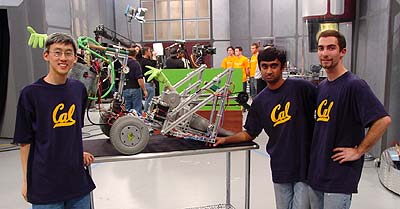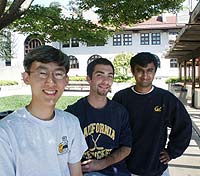 |
Eric Park, Bharathwaj Muthuswamy, and Daniel Lehrbaum built the Cal Clutter Collector in under a day. (Photo courtesy DIY Network) |
UC Berkeley engineering students race to build robots for their 15 minutes of fame
BERKELEY - Building a robot, even a simple one, is no small task. Some UC Berkeley engineering classes spend an entire semester doing just that. Now imagine that you are in an eight-hour competition to build one that can, say, quickly collect toys and put them in a box - using only parts on hand in a warehouse. Sound hard? Not for Berkeley engineering students Eric Park, Bharathwaj "Bart" Muthuswamy, and Daniel Lehrbaum, who beat a University of Tennessee team on the Do-It-Yourself (DIY) Network show "Robot Rivals."
The biggest challenge, they say, was the television cameras pointed at them the entire time. "They kept making us take the pieces apart and do it over more slowly for the cameras," says Muthuswamy, a first-year Ph.D. student in electrical engineering at Cal. "We also couldn't swear, which was hard. I won't make fun of actors ever again."
Dream team
Park was the first to hear that "Robot Rivals" was looking for contestants, back in January when electrical engineering and computer science (EECS) professor Ron Fearing made an announcement in his EE192 class, Mechatronics Design Lab. The rules required teams to include at least one mechanical engineering, one electrical engineering, and one computer science student. Park, an EECS major (he graduated in May) quickly recruited Lehrbaum, a mechanical engineering major who will graduate in December 2003, and Muthuswamy.
Theirs turned out to be the only Berkeley team to apply. Other contestants might have been scared off. Park and Lehrbaum are veteran robotics contestants - they used to be on rival robotics teams in high school, in San Francisco and Palo Alto, respectively. Park started building robots in the seventh grade and has competed in six robot-building face-offs by his own count, including the For Inspiration and Recognition of Science and Technology (FIRST) Robotics competition (founded by Segway creator Dean Kammen) and the San Jose Tech Museum's Tech Challenge. The awards he won from FIRST landed him three consecutive summer internships at the NASA Ames Research Center in Mountain View, California. Now that he's graduated, he has a full-time job at NASA Ames working on autonomy and robotics research.
Lehrbaum, who also competed in several FIRST competitions, is researching neuroprosthesis, or how a device can monitor nerves and mimic the brain's commands to move a body part. And although this was the first contest for Muthuswamy, he has several robotics projects under his belt, including an analog obstacle-avoidance robot and an autonomous microprocessor-based race car.
Clutter buster
Each episode of "Robot Rivals" pits two teams of top-notch engineering students from 14 leading U.S. technical institutes and rival colleges. The show throws the students in a gigantic warehouse stocked with parts and gadgets, then challenges them to design and build a robot that can perform a specific task, including a "Lunar Rover" robot (with two wheels or less that can traverse a number of different surfaces), "Bomb Retrieval" robots (break through drywall, then gather eggs into a basket); and "Paul Bunyan" gadgets (cut down three trees and chop and stack wood). After students design the robot, they get handed surprise household items with bonus points if they can incorporate them.
 Park, Lehrbaum, and Muthuswamy wanted the chance to see Tennessee, but spent all the time they weren't filming doing homework in their Knoxville hotel. (BAP photo) |
Once built, Berkeley's Cal Clutter Collector had to take on the University of Tennessee's Horned Scooper in a final competition, with points for each element of the task. The smaller the toys the robots managed to scoop up and deposit in a toy box, the more points. The team whose robot earns the most points in five minutes moves on to the competition's next round.
The contest was a heated one. With Muthuswamy controlling the rake thing, Park controlling the motor, and Lehrbaum "mostly yelling at that point," the Cal Clutter Collector was doing well, scooping and dunking a small beach ball for 25 points, until it started to smoke. "Our battery died during the match and started smoking," says Park. "They said that unforeseen problems like that were not our fault, so they stopped the timer and gave us a new battery."
In the show broadcast May 9, Cal beat Tennessee by just a matchbox car worth 25 points. (You can be forgiven for missing it: the DIY Network is only available by satellite service in the Bay Area.) In the episode that will first air June 13 at 9 p.m., the Berkeley team takes on Southern Illinois University, which beat the University of Massachusetts in the "dorm-room waiter" contest. Berkeley and SIU will compete to build robots that can propel golf balls at glass targets. The ultimate winner from the 14 engineering teams receives $2,000 for their school's engineering department, and the other 13 participants' departments get $500 scholarships for use in future robotics competitions.
A good trip
While the scholarship money is attractive, all three Berkeley students say that they entered the "Robot Rivals" contest for the fun of it. "We thought it would be interesting to go across the country and see Knoxville," says Lehrbaum. "Classes and lectures get routine - it's nice to get out there and use something you've learned."
Although they were supposed to be in Knoxville for three days for the taping, it ended up being five days as they waited for the snowed-in team from UMass. Being dedicated Cal students, they did not go sightseeing. "We were just doing our homework in the hotel and faxing it in," says Park. "But it was fun."
Now that they've seen the first episode, they all say admiringly that the editing was great. "They censored out all my swear words so you don't even notice I said them," Muthuswamy marvels. "Although when they made us run out at the beginning and yell, 'Go Bears!' I tripped and fell, and they still used that in the outtakes."
The three students signed a contract promising not to reveal who won before the episode airs. But as it turns out, the DIY Network breaks its own rules: as of June 10 it had already posted the results on its website. The Berkeley Bomber failed to hit as many glass targets with its golf balls as SIU's "Cleopatra Needle." Muthuswamy, Lehrbaum, and Park came home while the SIU team continued on to the next challenge.
They don't seem to mind. "TV is extremely stressful," says Lehrbaum.

